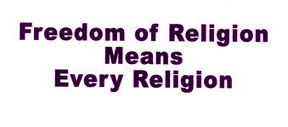
Freedom of religion
By Wikipedia
Freedom of religion is a principle that supports the freedom of an individual or community, in public or private, to manifest religion or belief in teaching, practice, worship, and observance; the concept is generally recognized also to include the freedom to change religion or not to follow any religion. The freedom to leave or discontinue membership in a religion or religious group —in religious terms called “apostasy” — is also a fundamental part of religious freedom, covered by Article 18 of the Universal Declaration of Human Rights. Freedom of religion is considered by many people and nations to be a fundamental human right.[3][4] In a country with a state religion, freedom of religion is generally considered to mean that the government permits religious practices of other sects besides the state religion, and does not persecute believers in other faiths. Historically freedom of religion has been used to refer to the tolerance of different theological systems of belief, while freedom of worship has been defined as freedom of individual action.
Each of these have existed to varying degrees. While many countries have accepted some form of religious freedom, this has also often been limited in practice through punitive taxation, repressive social legislation, and political disenfranchisement. Compare examples of individual freedom in Italy or the Muslim tradition of dhimmis, literally “protected individuals” professing an officially tolerated non-Muslim religion. The Declaration of the Rights of Man and of the Citizen (1789) guarantees freedom of religion, as long as religious activities do not infringe on public order in ways detrimental to society. In Antiquity a syncretic point-of-view often allowed communities of traders to operate under their own customs. When street mobs of separate quarters clashed in a Hellenistic or Roman city, the issue was generally perceived to be an infringement of community rights.
Cyrus the Great established the Achaemenid Empire ca. 550 BC, and initiated a general policy of permitting religious freedom throughout the empire, documenting this on the Cyrus Cylinder. Some of the historical exceptions have been in regions where one of the revealed religions has been in a position of power: Judaism, Zoroastrianism, Christianity and Islam. Others have been where the established order has felt threatened, as shown in the trial of Socrates in 399 BC or where the ruler has been deified, as in Rome, and refusal to offer token sacrifice was similar to refusing to take an oath of allegiance. This was the core for resentment and the persecution of early Christian communities. Freedom of religious worship was established in the Buddhist Maurya Empire of ancient India by Asoka the Great in the 3rd century BC, which was encapsulated in the Edicts of Ashoka. Greek-Jewish clashes at Cyrene in 73 AD and 117 AD and in Alexandria in 115 AD provide examples of cosmopolitan cities as scenes of tumult.
